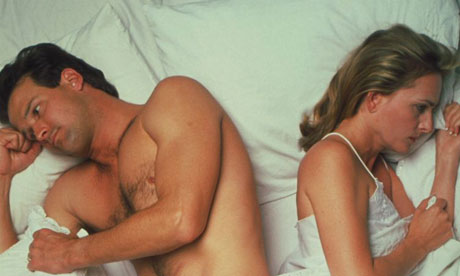
Ever since Viagra arrived a decade ago and became a global blockbuster worth billions, an equivalent that works wonders for women has been the Holy Grail for drug companies.
Yesterday, doctors announced that the search might finally be over. A major clinical trial of a drug some already describe as the "female Viagra" showed it can boost sexual desire in women whose libidos are flagging.
The drug, which was originally developed as an antidepressant but was later found to have libido-boosting side effects, could be approved for use in Britain within 18 months.
Women who took the drug during the six-month trial reported more satisfying sexual encounters and higher libidos than those who were given a placebo.
Doctors involved in the study said the drug may prove to be an effective treatment for low libido, a problem they estimate affects between 9% and 26% of women, depending on their age and whether they have been through the menopause.
The drug has proved controversial among sex researchers. Some argue pharmaceutical companies are exaggerating the number of women affected by low libido to expand their market, and are pushing a pill that will not deal with psychological issues that might put someone off sex, such as poor body image or stress.
Nearly 2,000 pre-menopausal women aged 18 and above took part in the study after being diagnosed with a condition called "hypoactive sexual desire disorder", characterised by a very low libido for long periods of time.
Women who took a daily 100mg dose of the drug, called flibanserin, reported having satisfying sex more often than those who took a placebo. Before the trial, subjects reported an average of 2.8 satsifying sexual events per month. Those who took daily flibanserin saw this rise to 4.5 times a month, compared with a rise to 3.7 times a month for those taking placebo. None of the women knew whether they were taking the drug or the sham pills.
"It's essentially a Viagra-like drug for women in that diminished desire or libido is the most common feminine sexual problem, like erectile dysfunction in men," said John Thorp, professor of obstetrics and gynaecology at the University of North Carolina Medical School. The results were announced today at a meeting of the European Society for Sexual Medicine in Lyon.
Flibanserin was originally developed as an antidepressant by the German pharmaceutical company Boehringer Ingelheim. The drug performed badly in clinical trials and was never approved, but questionnaires given to the patients revealed that an unexpected side effect for women was a boost to their libido. According to some reports, some women were unwilling to give the pills back once the trial was over.
"Flibanserin was a poor antidepressant," said Thorp, who was involved in running the latest trial. "However, astute observers noted that it increased libido in laboratory animals and human subjects. So we conducted multiple clinical trials and the women in our studies who took it for hypoactive sexual desire disorder reported significant improvements in sexual desire and satisfactory sexual experiences."
Viagra was originally developed as a treatment for high blood pressure and the heart condition angina, but men who took part in early trials realised the drug had an interesting side effect. The drug arrived in 1998 and has since been prescribed to 25 million men creating a multibillion pound global market.
In the latest trial, doctors asked women to keep a record of how often they had satisfying sex and to rank their day-to-day sexual desire in an electronic diary. A variety of other tests were used to assess their libidos and levels of stress experienced during sex. These were compared with information taken before and after the trial.
Thorp said the results point to a possible treatment for "the sexual problem that plagues reproductive age women the most".
Petra Boynton, a healthcare researcher at University College London, said the pill was not a "magic bullet" and feared it could stop couples talking through underlying issues. "There are all kinds of physical, psychological and emotional reasons that could put someone off sex and a pill is not going to help resolve those. It's not going to make you feel better about your body image and it won't make your partner better in bed," she said.
A spokeswoman for Boehringer Ingelheim said the drug could be approved for treating women with a low libido within 18 months. The data from the latest trials will be sent to American and European drug regulators to review.

